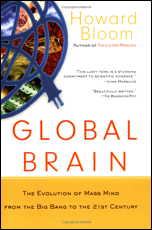Tuesday, March 3, 2009
The Five Elements of the Crowd Mind
 Howard Bloom in his book Global Brain – which traces that brain from the big bang to the beginnings of bacterial life on earth to our current times –, mostly following physicist Eshel Ben-Jacob, lists the following elements in regards to how the “social learning machine” does its thing... like for instance bacteria, or humanity:
Howard Bloom in his book Global Brain – which traces that brain from the big bang to the beginnings of bacterial life on earth to our current times –, mostly following physicist Eshel Ben-Jacob, lists the following elements in regards to how the “social learning machine” does its thing... like for instance bacteria, or humanity:
- Conformity enforcers
- Diversity generators
- Inner-judges
- Resource shifters
- Intergroup tournaments
Sara Wampler in her review of the book explains*:
Conformity enforcers ensure that groups maintain enough similarities to actually function as a group. These “enforcers” are group members who, like the bully on the playground or the informant in a police state, demand obedience to some behavioral norm in exchange for protection from harm. In the best sense, conformity enforcers encourage unity and the pursuit of normalization; in the worst sense, enforcers stifle creativity and destroy deviants. These enforcers are balanced by another element: the “diversity generators.” These individuals each test a new hypothesis of the communal mind, exploring possibilities that conformity enforcers would ignore. They “spawn variety” and open paths to new developments. Generally, diversity generators seem overwhelmingly positive; however, they require some amount of balance, or the individuals lose their connection to the group. When too many members fail to identify with and protect the group, the group dies, and is thus removed from the “global brain.” So, some amount of conformity is required to ensure that the diversity generators do not diversify to the point of their group’s destruction.
While conformity enforcers and diversity generators are actually individuals within the system, the remaining three elements – inner-judges, resource shifters, and intergroup tournaments – are instead personal and group mechanisms for development and control. Inner-judges are, according to Bloom, the equivalent of cellular mechanisms that encourage apoptosis (cell death). These judges, through some (...) system of hormones and chemicals, create a sometimes overwhelming feeling of despair in individuals who have failed to contribute to the group. Inner-judges are usually harsh, unforgiving critics who can encourage individuals to remove themselves from the progress of the group, either through suicide or through an inability to continue performing tasks. One’s critic is often triggered by the work of a “resource shifter” – something that “shunt[s] riches, admiration, and influence to learning-machine members who cruise through challenges and give folks what they want.” A resource shifter is not necessarily an individual; it can “range from social systems to mass emotions.” It also works in both directions, since it can either heap rewards upon some members, or “cast...some into some equivalent of pennilessness and unpopularity.” In some instances, the resource shifter acts based on the outcome of intergroup tournaments – friendly or serious competitions between groups that “force each collective intelligence, each group brain, to churn out innovations.” Resource shifters reward the winners of intergroup tournaments, ensuring that their innovations are further explored. But, the shifters also take away needed resources from the losers, fueling the self-destructive impulses of their inner-judges and starting a chain of negative reinforcement that, if left unchecked, can lead to the annihilation of the entire group.
Group formation, then, is not simply the random result of individual selection; rather, individuals and groups are selected together, with the needs of the group shaping the destinies of its members. An individual success or failure is important to the group only because it confirms or destroys a hypothesis, not because the genetic success of each individual is encouraged.
*I’ve removed the review-related criticism of the book in the marked part as I want to include this just as an explanation.
>> More posts
Advertisement
This site unofficially covers Google™ and more with some rights reserved. Join our forum!
